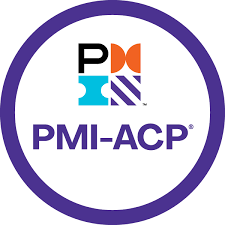
PMI- Agile Certified Practitioner (ACP)®
Agile Certified Practitioner (ACP) is a professional certification from Project Management Institute (PMI). Agile certification enforces change in mindset for managing projects in a dynamic environment. It is different to the classic waterfall project management methodology where scope, plan and cost is frozen in the beginning and any changes would be extremely difficult in the later stages of the project. Agile embraces change and has iteration based delivery model which allows users to have quicker outputs to align expectations. PMOBytes along with 360PMO (PMI REP) offers the below Virtual training course for professionals pursuing towards being Agile:
| Course Module | Topics |
| PMI-ACP Overview | PMI-ACP Certification overview PMI-ACP Eligibility Requirements Certification Process Content Outline -Domain & Tasks, Exam Information Reference Material |
| What is Agile? | What is Agile? Agile history Agile Manifesto Agile Values Agile Principles Being Agile vs. Doing Agile Why Agile? Agile, an Umbrella term Prescriptive vs. Adaptive methods |
| Agile and Traditional Project Management | Traditional project management phases Agile incremental delivery Evolution to an Agile Triangle Differences between Traditional waterfall and Agile |
| Agile Teams | Agile Teams Generalize specialist / T shaped persons Agile team spaces Osmotic communication Five Dysfunctions of a Team Agility and stages of learning: Shu, Ha, Ri Tuckman’s Stages of Group Development The Dreyfus Model of Skill Acquisition Brainstorming Techniques Five Levels of Conflict and Resolution |
| Agile Planning & Estimation | Agile planning and estimation Multiple levels of planning Planning onion Product Vision Sample product vision statements Product roadmap Release planning Iteration planning Key Agile planning lessons Agile estimation Why do we estimate? What, who and how do we estimate? The cone of uncertainty Planning Poker Planning poker steps Affinity estimating |
| Scrum | Scrum roles, ceremonies and artifacts Scrum pillars Scrum cycle summary Scrum roles Product Owner Scrum Master and Development Team Scrum ceremonies Sprint planning Daily stand-up Review Retrospective Scrum artifacts Product Backlog Sprint Backlog Sprint Increment |
| Extreme Programming (XP) | Extreme Programming XP values (courage, feedback simplicity, respect, and communication) Principles (diversity, humanity, improvement, failure, reflection, flow…) Integration practices (continuous integration, ten minutes build) Team practices (Energized work, information workspace, whole team, sit together) Planning (stories, weekly cycle, quarterly cycles) Programming (test first programming, pair programming, incremental design) Key roles Key concepts (refactoring, technical debt, time-boxing, last responsible moments, mindfulness, theory of constraint) Scrum vs. extreme programming |
| Lean | What is Lean Seven wastes of software Development Lean Development Principles Value Stream Mapping Theory of Constraints |
| Kanban | Kanban Kanban board with Work in Progress (WIP) Five core principles of Kanban Classes of Services (CoS) Kanban Attributes Scrum vs. Kanban |
| Product Backlog | Product Backlog Product Backlog Grooming Properties of a good Backlog: DEEP) |
| User Stories | User Stories User Story Template The 3C’s of a User Story Attribute of good user stories (INVEST) Sample User Stories Slices vs. Layers Acceptance Criteria User roles User Persona Why Persona is important Extreme Characters Epic, Stories, and Themes Compound Story Complex Story |
| Agile Testing | Agile Testing Effective Testing in Agile Projects Test Driven Development (TDD) Acceptance Test Driven Development) Stage of ATDD Cycle Exploratory Testing Testing approaches: Scripted vs. Exploratory Agile Testing: Key Learnings |
| Agile Metrics | Waterfall vs. Agile metrics Team Velocity Cycle time Activity: how to reduce cycle time Burn-up charts Burn-down charts Group activity: draw a burn-up chart Activity: reading burn-up and burn-down chart Cumulative flow Diagram (CFD) Escape defects |
| Agile Retrospective | What is retrospective Why Retrospective Five phases of retrospective |
| Extras | Flash Cards, Practice Exams and supporting resources |
Need More Information:
For any more clarification email us @ [email protected] in relation to any of the above courses.
